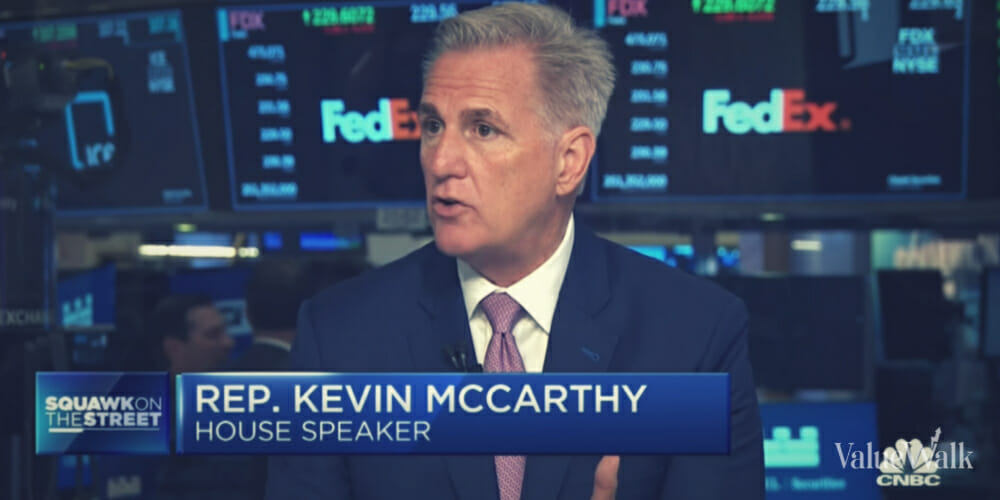Following is the unofficial transcript of a CNBC interview with United States House of Representatives Speaker Kevin McCarthy on CNBC’s “Squawk on the Street” (M-F, 9AM-12PM ET) today, Monday, April 17th.
House Speaker Kevin McCarthy On The Debt Ceiling
Q1 2023 hedge fund letters, conferences and more
CARL QUINTANILLA: This is one of those interesting moments where we're having a discussion about the issue and the players and we just happen to have House Speaker McCarthy here.
SARA EISEN: Yeah, where did you come from?
KEVIN MCCARTHY: Just walked on the floor. Thought I’d stop by.
QUINTANILLA: Welcome. It's good to have you.
MCCARTHY: Thank you.
QUINTANILLA: What what is your message upstairs? What was your message? And how do you think market should be responding to it right now?
MCCARTHY: Well look, 75 days ago, February 1st, I sat down with this President. And I sat down to him, I said, let's work together to be able to deal with the debt ceiling in our economy at the same time. It’s the same thing that we've done all in the past if you've mentioned. And for 75 days, he's ignored us.
I want us to find a responsible, sensible way to do this. My message upstairs is if the President won't pay attention to this, if he doesn't believe they can find $1 in savings, Republicans in the next couple of weeks will act and send a debt ceiling increase that will limit, save and grow, that will help us on economics growth in this country, will cap spending in the future, will pull back claw back the money we appropriated for Covid but has sat dormant for two years.
If it was appropriated to help you during Covid and you haven't spent it, it shouldn't be spent afterwards. So find the ways we can save the taxpayer money. Find a way that we can grow this economy to become less dependent upon China, curve our spending in the future so we can curve inflation to help every family.
And I think that's sensible and responsible, and we move the debt ceiling into the next year. If the President doesn't want to take action, we'll send this over to the Senate.
EISEN: But there is an Appropriations Committee and a budget for the for all of this. The fiscal year ends at the end of September. Why not deal with spending cuts and negotiate with the president there? Why why negotiate over the debt ceiling which is much more dangerous.
MCCARTHY: It's not dangerous at all, especially when you sit down on February 1. Now remember, the budget is different than a debt ceiling. A budget resolution is not like an estate capitol. The budget never even goes to the President.
So for the President to say do a budget that makes no sense. What you what you want to do is sit down with a debt ceiling just as America has done watch. When President Biden was a senator, four times he voted to increase the debt ceiling only if it included fiscal changes.
The times he voted against the debt ceiling is because he said there wasn't enough fiscal economic change. And think about it, a debt ceiling is like giving your child a credit card and they charge the limit all the way up. Would you just raise the limit? No, you would sit down—
EISEN: Well then you’re playing with America’s standing and faith, full faith and credit of U.S. government debt? I feel like you can deal with the spending in other ways which is totally legitimate.
MCCARTHY: Oh really? So if you just raise the debt ceiling, do you think $31 trillion of debt, the CBO has come out in the next 10 years, do you know we'll pay 10.5—
EISEN: You did it 3 times—
MCCARTHY: We’ll pay 10—
EISEN: In the Trump administration.
MCCARTHY: As we did economic changes. We never raised the debt ceiling by itself—
EISEN: But the tax cuts that was like $2 trillion of deficit.
MCCARTHY: And you know how much we're bringing in in revenue? On average in the 50-year average in America, you bring 17% of GDP. Today we're bringing 20. That's the only two other times in modern history in America have you ever brought 20% of GDP.
That's because the tax cuts actually created economy to grow and brought more revenue into the economy. But the problem is not about how much money we're bringing in where the President just wants to raise more taxes, it's our spending. On 50-year average, we normally only spend 21% of GDP.
Right now, we're spending 23.6, on our way to 25. So if you don't tackle the spending problem, you're never and if you if you ignore this problem and you just raised the debt ceiling, our debt is now $31 trillion. It's bigger than our entire economy by 20%. You're at a tipping point. So all you're going to do is cause more inflation.
Remember when Milton Friedman, my favorite economist said, “Inflation is only created in Washington,” and the only way you you curb inflation is you create the interest rate to be higher than the inflation rate. We've already had bank failures based upon this policy, where the Democrats spent 6 trillion more dollars.
So yes, our history has always been that we did not just raise the debt ceiling. President Biden every time did not believe in that. And I don't know why you'd want to change it now when we're more in economic dire straits because if you did what you were requesting.
You would create more inflation, more dependency on China, you would harm Social Security and Medicare. I mean, for the first time in a 10-year window, three trust funds will go insolvent. Infrastructure—
EISEN: I'm not suggesting we don't do anything about that. I'm just suggesting there's a time and place for it.
MCCARTHY: But this is our window. And the time—
EISEN: This is a technical—
MCCARTHY: And the time and place is right now just as we've watched every time before. I didn't wait to the last moment. I went in February 1. And I think the responsible thing to do, our government is designed to find compromise.
I'm not sitting here and saying, Mr. President, you have to do this. I think everybody in America realizes we should spend less than we spent before. We should find ways to grow and save and limit our growth.
QUINTANILLA: So then what do you say to those who wonder, cut what? Because we've watched debates about Social Security and Medicare and today and snap right looking for unanimity among that issue in the GOP alone? What are the cuts going to be? Where will you cut back?
MCCARTHY: Okay, well, I don't call them cuts because I call them savings because in our program, government will grow by 1%. But government under the Democrats in discretionary spending increased by 30%. This is more than inflation and GDP. This is what created inflation. Alright? So what are we talking about?
We're elected as elected officials. We should make decisions where we should spend our money just like every single family. We’ll prioritize where theirs should go but the first thing we should go we have a supply chain problem. President Biden when he was a senator, he he voted for work requirements. Now this is only for able bodied people with no dependents.
What it does, it helps them to get back in the workforce. We have more job openings than people are looking for jobs. If you want to call curve inflation down, you want to get the supply chain better, help people get back into the workforce. That's exactly what this will do. It's it's a hand up. Alright? So I believe I want to knock down the barriers.
The other place claw back the money that you've appropriated that hasn't been spent and it's useless, right? Then invest in American economy, in our energy of what we need, cut the red tape so we can build things again in America. That's the permitting reform that we just passed that was on a bipartisan level. I don't think this is as draconian, I actually think this helps.
QUINTANILLA: I did notice upstairs you also said on the Fed had they acted earlier, we wouldn't be in this situation.
MCCARTHY: That's true.
QUINTANILLA: Is there some is there some blame to be spread around to the Fed?
MCCARTHY: Well, there's, well the first blame is how did inflation get created? Well, Milton Friedman tells you, “Inflation only gets created in Washington.” It was the $6 trillion.
Even Democrats tell you it is the it is the immoral sin of when they when the Democrats passed their Covid bill that created the inflation, the extra $2 trillion. So that is created but the Fed had they acted faster, you could have stopped the rise of inflation.
EISEN: So are you, do you actually have your house members, your party on board with what you're proposing today? Because there are a number of Republicans that don't want to raise the debt ceiling under any circumstance, right? And you have a pretty thin margin. So—
MCCARTHY: Five seats.
EISEN: Five seats.
MCCARTHY: I don't know if you watched my speaker but it’s kind of close.
EISEN: It was close and that's what I'm asking. Do you have the support of your party for what you're actually proposing?
MCCARTHY: You know what I think I have, I have a supportive America, because I'll get the party behind it. But more importantly, what is wrong with sitting down on both sides and finding a responsible, reasonable way?
I mean, who in America wants to continue down this path where we spend more than we bring in, that we're leveraging our children's future, that we're creating inflation, that that the disruption that's happening today our own allies are going to China, that there's an attack on the dollar and you know what.
What Brazil and these other countries do won't knock the dollar off the world currency is what we do. If we continue to have a debt at 120%, we will crumble so what I'm standing up for is the future of this country.
And this is the time, this is the place and this is the moment and everybody can have a say in it. But I think the common sense, sensible, rational thing to do is exactly what Republicans are going to do. And you know what? We welcome Democrats to join with us, just as they joined with us on our energy bill.
EISEN: So even if you cobbled together the votes in the House then it goes to the Senate, then what?
MCCARTHY: That’s their responsibility.
EISEN: But that's not, what's the realistic chance of your proposal passing the Senate?
MCCARTHY: I think the same realistic plan when we told the District of Colombia that they can't decriminalize carjacking and murder and the President said he would veto it and ended up signing it. It's the same ability as when we said that the pandemic is over and the President said he had vetoed it and then he signed it last week.
So if I try everything, just based upon what's the opportunity, I shouldn't have to worry about that. I should stand up for the American public, work within Congress and send it to the Senate. Now it's not my fault that they don't do their job. I haven't seen them do much this year. I'd like them to.
QUINTANILLA: Finally Mr. Speaker, if if the U.S. faces a downgrade from the major ratings agencies, what will your message be on that day? Will it be I did—
MCCARTHY: It will—
QUINTANILLA: Not my fault, not our fault?
MCCARTHY: I want to make sure that day never comes. So that's why I'm here today. That's why in the next two weeks, we will act just as you talk about this is a couple months away. Why do we have to wait until a deadline to act and you're sitting talking to the Speaker of the House who's telling you he’s going to act. Has the senator done anything?
If the, if the advocation on the other side is to pass a clean debt ceiling, has the Senate passed that yet, would it pass, has the President proposed it? What have they done? What have they done to find savings?
The only thing the President says is he wants to raise more taxes. They actually inside his budget proposes raises to spend more money than we spent at the height of the pandemic. That makes no sense.
EISEN: So I was gonna ask you about taxes because I wonder because you want that you want to extend the Trump tax cuts, correct?
MCCARTHY: Yes.
EISEN: But isn't that a little hypocritical when you're talking about finding savings everywhere and being on an unsustainable fiscal path?
MCCARTHY: How's that hypocritical when it’s bringing in—
EISEN: Tax cuts, tax savings.
MCCARTHY: Really? You're sitting on the market, you're sitting where the future goes where people make an investment. So will this company actually be able to go public if they have more regulation and higher taxes, who gets more money—
EISEN: I get the argument for it—
MCCARTHY: You know what happens on this floor? People make an investment and it pays for their pension. People make an investment to pay for the kids’ education. And you'll know why these countries why these companies come here?
Because this is the place to grow. But right now, we're finding with competition with higher taxes with higher burdensome regulation into the administration that they're not always coming to this market.
So yes, I will always advocate for the idea that we are streamlining our tax policies, that we're also streamlining our regulation so America is the place you want to start that business.
EISEN: Is that why you're here today? Because people are wondering why you’re here—
MCCARTHY: I started my first business when I was 20 years old. And you know what I found out? Three lessons, right. I was the first to work, I was last to leave and I was last to be paid. But we created jobs. It actually paid my way through college.
It determined something even greater, right. I actually applied for an internship with my local congressman and was turned out and today I sit as the Speaker of the House to see that couldn't get an internship for. So the one thing is I never give up.
So I'm not going to make a decision based upon whether somebody else is going to act. I'm going to do what is in the best interest of America and for our future children. And I think being here, talking about this problem what the President has ignored for 75 days is the right place to be at the right time.
EISEN: Speaker McCarthy, thank you very much for taking the time.
MCCARTHY: Thank you. It's an honor.













